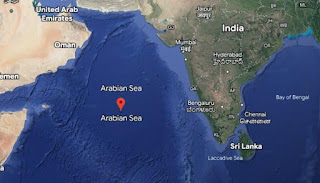Stretching along the southwestern coast of the Indian subcontinent, the Arabian Sea stands as a testament to the remarkable interplay between nature's offerings and human endeavors. This expansive body of water, bordered by India to the east, the Arabian Peninsula to the west, and the Horn of Africa to the south, holds paramount economic and ecological importance for India, shaping industries, livelihoods, and environmental dynamics.
Economic Significance:
The Arabian Sea has long been a conduit for trade and commerce, connecting India to the Middle East, East Africa, and beyond. The sea's strategic location facilitates maritime trade routes, rendering it a hub of economic activity. The ports along its coastline, such as Mumbai, Kochi, and Kandla, serve as vital gateways for imports and exports, bolstering India's trade connections with global markets.
Fishing forms an integral part of the coastal economy. The Arabian Sea teems with a diverse array of marine life, sustaining an extensive fishing industry. The waters yield a variety of fish, shrimp, crabs, and mollusks that not only provide sustenance to local communities but also support an export-oriented seafood industry. The thriving marine trade contributes significantly to the national economy, generating employment and foreign exchange earnings.
Offshore energy resources further underscore the economic importance of the Arabian Sea. Vast reserves of oil and natural gas lie beneath its seabed. India's offshore oil production accounts for a substantial portion of its energy needs, reducing its dependence on imports and enhancing energy security. The exploration and exploitation of these resources have spurred investments in infrastructure and technology, nurturing a complex ecosystem of energy-related industries.
Ecological Significance:
Beyond its economic role, the Arabian Sea is an ecological hotspot, fostering a delicate balance of marine life and environmental processes. Its warm and nutrient-rich waters create an ideal breeding ground for a diverse array of marine species. The sea is known for its vibrant coral reefs, mangrove forests, and rich biodiversity, which contribute to the overall health of the marine ecosystem. Indian Water Bodies
The Arabian Sea is central to the monsoon phenomenon that profoundly impacts India's climate and agriculture. The sea's surface temperature and atmospheric interactions drive the Indian Ocean Dipole and the Indian Ocean Monsoon, influencing rainfall patterns across the subcontinent. Timely monsoons are crucial for agricultural productivity, and millions of livelihoods depend on successful harvests facilitated by this climatic phenomenon.
